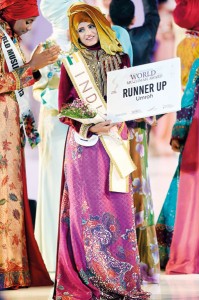View(s):
PRAMBANAN, Indonesia, Nov 21 (AFP) -An eclectic mix of women from around the world will compete in the finale of a pageant exclusively for Muslims in Indonesia Friday, seen as a riposte to Western beauty contests.
Runner up of the 2014 World Muslimah Awards Nazreen Ali (C) of India smiles at the grand final in Yogyakarta on November 22, 2014. An eclectic mix of women from around the world competed in the final of a pageant exclusively for Muslims in Indonesia (AFP)
The women, who include a doctor and a computer scientist, are set to parade in glittering dresses against the backdrop of world-renowned ancient temples for the contest in the world’s most populous Muslim-majority country.
However the 18 finalists are required to wear the Muslim headscarf and will be judged not only on their appearance, but also on how well they recite verses from the Koran and their views on Islam in the modern world.
The World Muslimah Award first drew global attention in 2013 when organisers presented it as a peaceful protest to Miss World, which was taking place around the same time on the resort island of Bali.
While it remains popular in some countries, British-run Miss World has faced frequent accusations that it is degrading to women, and a round in which contestants pose in bikinis has been a lightning rod for criticism.
In an effort to appease hardliners, Miss World organisers axed the bikini round for the Bali edition, but the event still sparked demonstrations from Islamic radicals who dubbed it a “whore contest”.
‘Headscarves not scary’
British contestant Dina Torkia said she hoped this year’s World Muslimah Award would not only provide a contrast to Western beauty pageants, but would also dispel prejudices against Islam.
Winner of the 2014 World Muslimah Awards Fatma Ben Guefrache of Tunis gives a victory sign(AFP)
“I think the most important thing is to show that we are really normal girls, we are not married to terrorists. This scarf on my head isn’t scary,” she told AFP.
During their time in Indonesia, contestants have visited orphanages and nursing homes, and had their pictures taken at Borobudur, a famous Buddhist temple close to Yogyakarta, Java’s cultural heart.
The finale takes place on a stage against the backdrop of Prambanan, a ninth-century complex of Hindu temples on the island of Java that is a UNESCO World Heritage Site.
Hosting the event at a Hindu site was a conscious decision to show that Muslims are accepting of other religions, organisers said.
